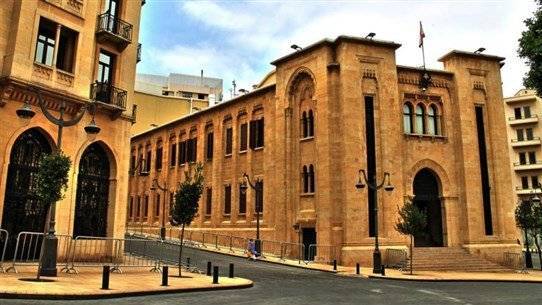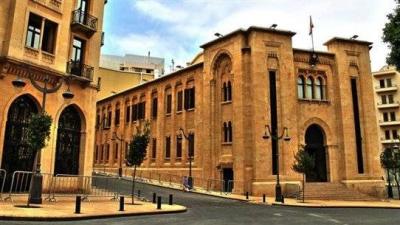The session for the election of the secretariat members and three commissioners in the Office of the House of Representatives and members of parliamentary committees exacerbated the already existing rift among the deputies of the "13 Group." This election revealed a division between those preferring practicality and rationality in performance and those wanting to engage in illusory battles as if they were still on the streets.
After the election round for the secretaries and commissioners, as well as for the Finance and Budget Committee and the Administration and Justice Committee, those advocating for electoral battles succumbed to the prevailing view of consensus. This was after failed attempts and efforts led by Deputy Speaker Elias Bou Saab in the days leading up to the session, which continued to be coordinated between Speaker Nabih Berri and Deputy Michel Moawad.
According to "Nidaa al-Watan," these efforts culminated in an agreement that these change-making deputies would join the committees later through the withdrawal or resignation of their colleagues to make room for deputies from the "change" group. This is notable since some of them believe that serious and effective change requires being part of the committees from within, rather than from the outside. It should be pointed out that each deputy has the right to attend all committee meetings, but voting is restricted to committee members. This is crucial as a single vote significantly influences the approval of any project or proposed law.
Following the elections for the secretariat and commissioners, the elections for other committees were conducted through acclamation, with a few exceptions. There was an exchange among the deputies; for instance, Deputy Adib Abd al-Masih replaced Deputy Muhammad Yahya in the Public Works and Energy Committee, Deputy Ali al-Muqaddad replaced Deputy Ahmad Rustum in the Health Committee, Deputy Muhammad Yahya replaced Deputy Adib Abd al-Masih as rapporteur for the Agriculture Committee, Deputy Jihad Baqradouni replaced Deputy Kamil Shmeoon in the Youth and Sports Committee, Deputy Yassin Yassin was selected as rapporteur for the Media Committee instead of Deputy Muhammad Suleiman, and Deputy Farid al-Boustani became the chair of the Economy Committee instead of Deputy Michel Daher.
The Finance Committee elections saw Deputy Ibrahim Mneimneh ousted, receiving 44 votes compared to 60 for Deputy Adnan Traboulsi, while Deputy Mark Daou, who initiated the electoral battle, received 22 votes, and Deputy Halima Qaqour received 18 votes in the Administration Committee elections.
In the elections for the secretariat, Deputy Hadi Abou al-Hassan received 85 votes against 30 for Deputy Mark Daou and 3 blank votes. In the commissioners' elections, Deputy Agob Baqradounian secured 85 votes compared to 23 for Deputy Paula Yacoubian and 7 blank votes. There was also a vote for Deputy Elias Hankash, who had run but then withdrew from the secretariat position, and a paper was found with "No to sectarian distribution" written on it.
During the nomination process, before the voting began, Deputy Sami Gemayel raised the issue of the majority controlling the distribution of committee memberships and the need to operate outside the electoral logic, similar to what occurs in parliaments worldwide regarding the equitable distribution of committees among blocs. Speaker Berri responded, asking Gemayel which majority he was referring to and urging him not to overstate the matter.
Deputies Gibran Bassil, George Adwan, Wail Abou Faour, and Farid Khazen raised the issue of considering the traditional sectarian distribution in the secretariat and commissioner membership, prompting Yacoubian to address Berri, stating: "We left you to speak Armenian, Mr. President."
Before the vote for the Administration and Justice Committee membership commenced, after Qaqour's candidacy and a demand from the "change" deputies through Deputy Melhem Khalaf for consensus, Berri stated: "As you know, Deputy Speaker Elias Bou Saab has been working for several days to reach a consensus to represent all unrepresented blocs in the committees, especially the change deputies, but he informed me that these efforts had failed and that things were 'not working,' as evidenced by the nominations."
He added: "The effort was that a change deputy would replace another deputy, even if from my bloc. Deputy Michel Moawad spoke with me and you about the same effort, and I remain prepared for that. I said this based on the guarantee of a consensus as a complete package, but you broke the agreement and proceeded to elections."
In response to a question from one of the deputies about whether he was under any pressure in this matter, the Speaker replied: "No one has any pressure on me except God."
The legislative session proceeded according to the agenda, with the House completing its "legislative imposition" according to the International Monetary Fund's specifications, ratifying the law to lift banking secrecy. It also approved other items, particularly those concerning $150 million in loans from the World Bank for wheat procurement and $25 million aimed at addressing the COVID-19 pandemic, with commitments and texts requiring concerned ministers to provide a monthly report detailing the operational value distribution for each loan to the House.
Despite requests from some deputies, no expedited proposal was introduced outside the agenda, an action that both Deputy Waddah al-Saad and Deputy Paula Yacoubian deemed a violation of Article 42 of the internal regulations.
However, the most notable absence was the proposal previously submitted by the "Democratic Gathering" deputies regarding the extension of the dismissal of general directors from security and military agencies, with a lack of demand for its consideration from the proposers. This could indicate a potential advancement on the government formation file, thus negating the need for it, as there would be a fully empowered government capable of appointing replacements.
Alongside the appointments file, discussions in the session regarding the law to lift banking secrecy highlighted remarks from Deputy Melhem Riachi from the "Strong Republic" bloc, who criticized the IMF's treatment of Lebanon, likening it to a laboratory or colony. This prompted a response from Speaker Nabih Berri, who stated: "Firstly, this statement is serious in the House of Representatives; I do not act under anyone's order, I see my country's interest first. The IMF does not control the country, nor do I."
After the session, Deputy Ibrahim Kanaan announced that "the retroactive effect of lifting banking secrecy was approved, and the vast majority of the amendments requested by the President of the Republic were adopted."




